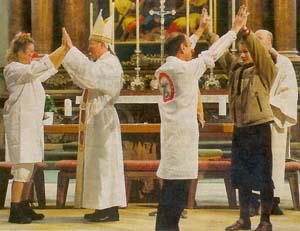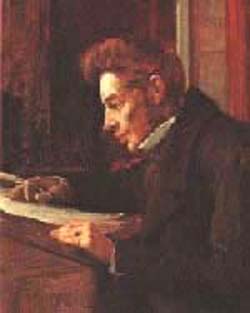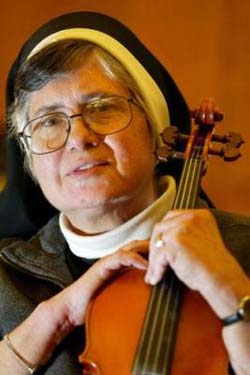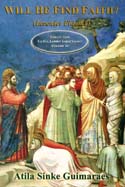 |
Consequences of Vatican II
The Nervousness of Progressivism
Lyle J. Arnold, Jr.
In his book titled Nervousness, Temperament and the Soul (1), Fr. Joseph Massmann discusses the excitable soul:
"In itself this easy excitability is an advantage, a perfection. The advantage lies in the ease with which the possessor attains to a sympathetic understanding of any intellectual problem. It makes a man a genius, ennobles him provided he learns to control himself. People of outstanding greatness in the sphere of grace - saints, and famous men and women in other spheres, such as great artists - have this gift in abundance, this ability to understand and to sympathize. It is often, primarily, one of the fruits of the working of grace in the soul" (2).
He goes on to say, however, that when this God-given grace is not "mastered," such excitability degenerates into a "nervous" soul, a soul out of control. The author goes on to say, "Nervousness is a disease of modern times ... People show themselves irritable in the face of authority, any subordination, any demand for obedience" (3).

Confused and crazy liturgy: a fruit of Vatican II |
If it were possible to condense the thinking of Progressivism based on this assessment of Fr. Massmann, I would say that its followers also revolted against the authority of the teaching Church, and renounced obedience to that authority. This defiance of the past - in the doctrine, liturgy, and tradition - defines Progressivism, which reflects in its language.
Fr. Massmann stated that the language of great thinkers is clear as crystalline water. This does not apply to the language of Vatican II.
When someone attempts to make a sound analysis of Vatican II by examining its language, it is deemed impossible. The texts are so ambiguous that they could be taken in either an orthodox or "neo-modernist current." (4) Speaking of this ambiguity in conciliar language, Atila Guimaraes notes, "Thus, Progressivism entered the official documents of the Magisterium with its head covered by the laced veil of the old traditional language." (5) Given this ambiguity of language, he continues, "one must seek in the spirit of the Council the elements required to interpret it correctly" (6).
Kierkegaard's confused thinking
Conversely, it is impossible to understand the following words, written by Soren Kierkegaard, the father of Existentialism, in his book Either/Or (1843): "Dread is a sympathetic antipathy and antipathetic sympathy."

Kierkegaard, a confused thinker |
What exactly do these words mean? According to Kierkegaard we must make a choice of either the aesthetic life or the ethical life. For Kierkegaard the aesthetic life is the opposite of what the word means. For him, aesthetic is sensory and low. The ethical is the spirit, and it causes in man a "dread." Without delving deeper, this is the essence of what the above quote means... (7) Behold the language of an existentialist. It is the opposite of clarity, muddy water instead of crystalline. It is no wonder that it was said of Existentialism that it "is less a philosophical system than a bad mood" (8).
John Paul II's philosophy was Phenomenology, a discipline "particularly important to the early development of Existentialism." (9) It is hard to resist speculation that his philosophy made him the perfect fit for ambiguity. About John Paul's slippery words, one writer said the following:
"There always seems to be some ‘way out’ of the Pope's outrageous statements, as though an arm or leg of St. Augustine or St. Thomas Aquinas were stuck, artificially, onto a statue of Zoroaster or a photograph of Freud." (10)
The performer "hermit"
Who can understand the language of a progressivist? Take this example, please, and try.

"Hermit" nun Sr. Laurel mixes a habit and blue jeans, orchestral performance and solitude... |
A front-page cover story appeared in a California newspaper recently about a hermit nun. (11) Her Bishop "formalized her status" of hermit, to live in an apartment in a semi-solitude. Her solitary life is described thus:
"Sister Laurel O'Neal frequently trades her habit for blue jeans. She rims her blog entries with brilliantly colored artwork. She teaches adult education classes and plays first violin with the Oakland Civic Orchestra ... A chapel (existing) in her room holds a tabernacle, and within it the instruments of the Eucharist, which she performs here and for other residents in the complex."
What are the instruments of the Eucharist, which she performs? This unintelligible, nervous statement could have been spoken by Kierkegaard himself. The Eucharist is the Body, Blood, Soul and Divinity of the Incarnate Word. The reader can imagine these "instruments" according to any number of subjective fantasies. Like the alleged release of the Fatima Secret in 2000, with its esoteric vistas, its meaning exists in the vagaries of subjectivism. I will not elaborate on the images that come to mind of a woman in blue jeans doing her performance with these "instruments." We are also left confused about what exactly a "solitary life" means for this type of progressivist contemplative...
The speech of Catholics should reflect clarity, pointing to a faith grounded in the perennial teachings of the Church. "But let your speech be: Yea, Yea: No, No: that you fall not under judgment." (James 5: 12).
Let me return to Fr. Massmann's injunction, that when the grace of an excitable nature is not "mastered," it degenerates into a nervous nature, and ipso facto into nervous words. It is no wonder that the nun who "frequently trades her habit for blue jeans" and "performs" the "instruments of the Eucharist" has taken the progressivist path. This has been the path of choice since Vatican II. Given the language of the Council, language that cannot be used to decipher the essence of anything, nervousness has become a way of life for Progresivism and its followers.
1. First published in the 1930's, available through Roman Catholic Books, P.O. Box 2286, Fort Collins MCO 80522.
2. Ibid, p. 26.
3. Ibid.
4. Atila Sinke Guimaraes, In the Murky Waters of Vatican II, Metairie, Louisiana: Maeta, 1997, pp. 35-38.
5. Ibid.
6. Ibid, p. 37.
7 Mark and Bev Tindall, "Soren Kierkegaard," http://jmm.aaa.net.au/articles/12580.htm.
8 Judy Jones & William Wilson, An Incomplete Education, NY: Ballantine Bks, 1987, p. 320.
9. http://www.questia.com/library/phenomenology jsp.
10. John Rao, "The Worst Pontificate in History," The Remnant, 8-31-04, p. 13.
11. Rebecca Rosen Lum, "Catholic nun embraces solitary life of faith," Contra Costa Times, 10-8-07.

Posted October 19, 2007

Related Topics of Interest
 Two Levels of Ambiguity Two Levels of Ambiguity
 Deadly Ambiguity Deadly Ambiguity
 Vatican II Revisited Vatican II Revisited
 The Growing Rejection of Vatican II The Growing Rejection of Vatican II
 The Catholic Revolution: New wine, Old Wineskins The Catholic Revolution: New wine, Old Wineskins
 Who Are these Dancing Ladies? Who Are these Dancing Ladies?



|
Vatican II | Hot Topics | Home | Books | CDs | Search | Contact Us | Donate

© 2002-
Tradition in Action, Inc. All Rights Reserved
|
 |
|